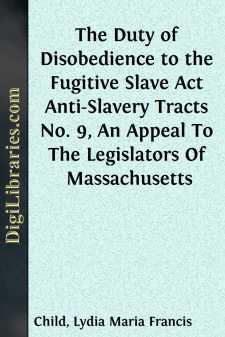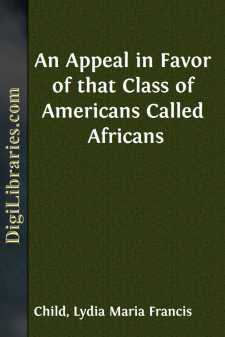Categories
- Antiques & Collectibles 13
- Architecture 36
- Art 48
- Bibles 22
- Biography & Autobiography 813
- Body, Mind & Spirit 142
- Business & Economics 28
- Children's Books 14
- Children's Fiction 11
- Computers 4
- Cooking 94
- Crafts & Hobbies 4
- Drama 346
- Education 46
- Family & Relationships 57
- Fiction 11829
- Games 19
- Gardening 17
- Health & Fitness 34
- History 1377
- House & Home 1
- Humor 147
- Juvenile Fiction 1873
- Juvenile Nonfiction 202
- Language Arts & Disciplines 88
- Law 16
- Literary Collections 686
- Literary Criticism 179
- Mathematics 13
- Medical 41
- Music 40
- Nature 179
- Non-Classifiable 1768
- Performing Arts 7
- Periodicals 1453
- Philosophy 64
- Photography 2
- Poetry 896
- Political Science 203
- Psychology 42
- Reference 154
- Religion 513
- Science 126
- Self-Help 84
- Social Science 81
- Sports & Recreation 34
- Study Aids 3
- Technology & Engineering 59
- Transportation 23
- Travel 463
- True Crime 29
Lydia Maria Francis Child
Lydia Maria Francis Child (1802-1880) was an American abolitionist, women's rights activist, and prolific author known for her novels, domestic manuals, and children’s literature. She gained prominence with her novel "Hobomok" (1824) and became a vocal advocate for the abolition of slavery, notably through her influential work "An Appeal in Favor of That Class of Americans Called Africans" (1833). Child's writing extended to the promotion of Native American rights, and she is remembered for her strong, progressive stances on social issues of her time.
Author's Books:
Sort by:
THE MAGICIAN'S SHOW BOX. There was once a boy, named Gaspar, whose uncle made voyages to China, and brought him home chessmen, queer toys, porcelain vases, embroidered skullcaps, and all kinds of fine things. He gave him such grand descriptions of foreign countries and costumes, that Gaspar was not at all satisfied to live in a small village, where the people dressed in the most commonplace way....
more...
APPEALTO THELEGISLATORS OF MASSACHUSETTS. I feel there is no need of apologizing to the Legislature of Massachusetts because a woman addresses them. Sir Walter Scott says: "The truth of Heaven was never committed to a tongue, however feeble, but it gave a right to that tongue to announce mercy, while it declared judgment." And in view of all that women have done, and are doing, intellectually...
more...
INTRODUCTORY CHAPTER The true economy of housekeeping is simply the art of gathering up all the fragments, so that nothing be lost. I mean fragments of time, as well as materials. Nothing should be thrown away so long as it is possible to make any use of it, however trifling that use may be; and whatever be the size of a family, every member should be employed either in earning or saving money....
more...
Chapter I. Here let us seek Athenæ's towers,The cradle of old Cecrops' race,The world's chief ornament and grace;Here mystic fanes and rites divine,And lamps in sacred splendour shine;Here the gods dwell in marble domes,Feasted with costly hecatombs,That round their votive statues blaze,Whilst crowded temples ring with praise;And pompous sacrifices hereMake holidays throughout the year....
more...
LIFE OF ISAAC T. HOPPER Isaac Tatem Hopper was born in Deptford Township, near Woodbury, West New-Jersey, in the year 1771, on the third day of December, which Quakers call the Twelfth Month. His grandfather belonged to that denomination of Christians, but forfeited membership in the Society by choosing a wife from another sect. His son Levi, the father of Isaac, always attended their meetings, but...
more...
CHAPTER I.BRIEF HISTORY OF NEGRO SLAVERY.—ITS INEVITABLE EFFECT UPON ALL CONCERNED IN IT.The lot is wretched, the condition sad,Whether a pining discontent survive,And thirst for change; or habit hath subduedThe soul depressed; dejected—even to loveOf her dull tasks and close captivity.Wordsworth.My ear is pained,My soul is sick with every day's reportOf wrong and outrage, with which this...
more...
CHAPTER I. "What are you going to do with yourself this evening, Alfred?" said Mr. Royal to his companion, as they issued from his counting-house in New Orleans. "Perhaps I ought to apologize for not calling you Mr. King, considering the shortness of our acquaintance; but your father and I were like brothers in our youth, and you resemble him so much, I can hardly realize that you are not...
more...








